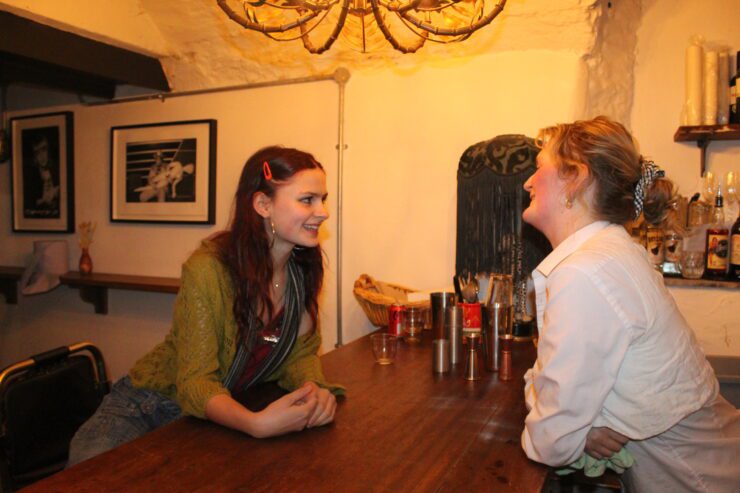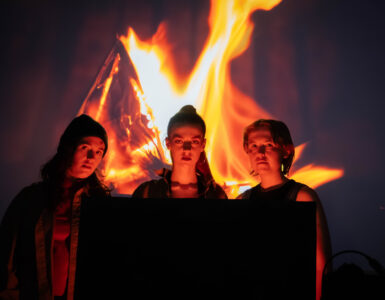Dates always go well until you realise that the person you’re dating just ordered the T-bone steak, and you were considering walking two miles home because the £1.80 bus fare seemed a bit steep. There’s differences and then there’s differences.
So what do you do if your new girlfriend is absolutely bloody stinking rich? Hardly Working, a show from Southwest theatre company BPM, endeavours to find out. This drama sees hospitality co-workers (I know – red flag) Charity and Lois fall in love and embark on a whirlwind romance. However, while Lois (Lily Simpkiss) is a working-class long-term employee of the pub, Charity (Honor Wiggins) is breezing through with her degree and seven-bedroom house in Parsons Green. The distance between them, built by language, education, living situation and privilege is immense, but so too is the love.
It’s a relationship conversation we’ve undoubtedly all had – when one of you has savings to buy the nice holiday away and one of you considered savings something exclusively accessible to early-retired 50-year-old golfers. It’s certainly awkward, but is it also unmanageable? Lois hopes not.
The play is set entirely at the bar in which the women work, and follows two timelines at the past and present of their relationship. From the outset their chemistry is electric, and the actors do an excellent job in showing just how easy it is to fall in love and look past the underlying issues in relationships. Jessie Millson’s writing is alive with truth and joy and carries a pace that is deeply engaging. Her exploration of class differences is totally in touch and often left me sitting with necessary unease. Hardly Working will not give you an easy ride if it is at all a familiar experience. Lily Simpkiss’ performance is equally discomforting and captivating, drawing us into her believable pain and desperate optimism.
The decision to make the relationship sapphic is very meaningful in this piece and adds an important lens in which to view class. Because of the patriarchy, there is a masculinity that comes with money – the role of the provider. It would be easy to extract this nuance from the story, but it was a worthwhile choice to include, as it adds depth and a truthful bitterness to the overarching narrative. Lois experiences a continual fear of losing Charity. Surely, she is the type of girl who will want more – will want to be spoiled, treated and nurtured. Lois, on the other hand, has never had anyone else to pick up the cheque before – she has been bred on the independence and self-reliance that the bread line. However, their financial differences force them into contrasting positions, Charity as “the man” and Lois as the one provided for. It is uncomfortable and adds to her anxiety of inadequacy and being left behind.
Despite this, I felt that the character of Martin, played by Rohan Chopra, a clumsy addition. His role in the piece is to represent the patriarchy as well as Louis internal anxieties about her relationship with Charity. Although he serves as a means for Louis to voice key themes of the script, it slowed the pace and detracted from the tragic realism present in the couple’s duologues. With some rework of the script, I think there could be a more complimentary and impactful way of getting these ideas across. As it stands, I think the thematic delivery leans a little too close to overstated and obtuse.
Fundamentally, the two characters are running different races. This is palpable as we see Charity dip in and out of the events room, a place for clientele and not servers, a place where Louis seemingly can never belong. Their love seems sorrowful and hopeless as they look towards futures that do not line up. Louis wants Charity and a home. Charity wants to travel and earn good money. When a fantasy for one lover is a starting off point for the other, where does their happy-ever-after belong?
Love is never easy, and communication is hard if you don’t speak the same language. Hardly Working digs into snapshots of young love that is bold and brave and careless and sure. It is as beautiful as it is heartbreaking and presents an inevitability we all hope one day to overcome. But when money, patriarchy and power is on the cards, isn’t there also a loser? And losing in love is always the most painful. Be prepared for a tight feeling in your chest at this bittersweet, perceptive and tender production.
Recommended Drink: “Beer. Beer. Beer.”
Catch Hardly Working until 24th August at theSpace on the Mile – Space 3 from 19:15. Tickets are available through the EdFringe Box Office.









